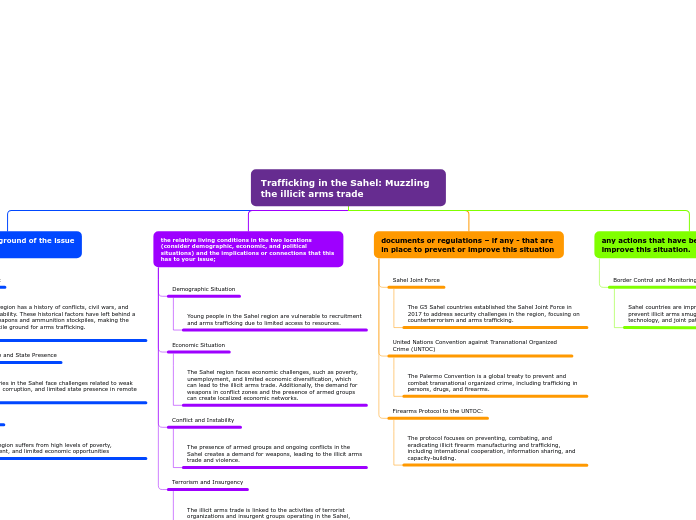Trafficking in the Sahel: Muzzling the illicit arms trade
causes or background of the issue
Historical Context
The Sahel region has a history of conflicts, civil wars, and political instability. These historical factors have left behind a legacy of weapons and ammunition stockpiles, making the region a fertile ground for arms trafficking.
Weak Governance and State Presence
Many countries in the Sahel face challenges related to weak governance, corruption, and limited state presence in remote areas.
Economic Factors
The Sahel region suffers from high levels of poverty, unemployment, and limited economic opportunities
the relative living conditions in the two locations (consider demographic, economic, and political situations) and the implications or connections that this has to your issue;
Demographic Situation
Young people in the Sahel region are vulnerable to recruitment and arms trafficking due to limited access to resources.
Economic Situation
The Sahel region faces economic challenges, such as poverty, unemployment, and limited economic diversification, which can lead to the illicit arms trade. Additionally, the demand for weapons in conflict zones and the presence of armed groups can create localized economic networks.
Conflict and Instability
The presence of armed groups and ongoing conflicts in the Sahel creates a demand for weapons, leading to the illicit arms trade and violence.
Terrorism and Insurgency
The illicit arms trade is linked to the activities of terrorist organizations and insurgent groups operating in the Sahel, providing them with the means to sustain their activities and pose a threat to regional security.
documents or regulations – if any - that are in place to prevent or improve this situation
Sahel Joint Force
The G5 Sahel countries established the Sahel Joint Force in 2017 to address security challenges in the region, focusing on counterterrorism and arms trafficking.
United Nations Convention against Transnational Organized Crime (UNTOC)
The Palermo Convention is a global treaty to prevent and combat transnational organized crime, including trafficking in persons, drugs, and firearms.
Firearms Protocol to the UNTOC:
The protocol focuses on preventing, combating, and eradicating illicit firearm manufacturing and trafficking, including international cooperation, information sharing, and capacity-building.
any actions that have been taken in order to improve this situation.
Border Control and Monitoring
Sahel countries are improving border control measures to prevent illicit arms smuggling, including surveillance, technology, and joint patrols with neighboring countries.
